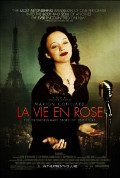
Directed by
Olivier Dahan
140 minutes
Rated M
Reviewed by
Sharon Hurst

Vie En Rose, La
Synopsis: French singer Edith Piaf had a relatively short but extraordinary and much-celebrated life. Born in 1915, she was the child of a café-singing mother and a street acrobat father. When neither seemed able to carefor her properly, Edith was taken to live in a brothel, run by her grandmother. As a teen singing on the streets she was discovered by nightclub owner Louis Leplée who set her on the road to stardom and nicknamed her La Mome (translated as The Kid Sparrow and better known in English as The Little Sparrow). Befriending famous people like playwright Jean Cocteau and actor Yves Montand her career skyrocketed, and she achieved international fame. But Edith had always been sickly, even as a child, and after a serious car accident in 1951 she became a morphine addict. Constantly plagued by collapses on stage, drinking, chronic pain and finally cancer, she died in 1963, by then a legend.La Vie En Rose is marked by three prominent chracteristics:
1. An infuriating time line that bounces all over the place
2. A mind-blowing performance by Marion Cotillard in the lead role
3. A soundtrack featuring the wonderful songs of Piaf
For the life of me I cannot understand why director Dahan decided to run with a scattergun approach to the timeline of Edith’s life. Sure, flashback from twilight years to early life is a popular device, but this film starts with an on-stage collapse in New York in 1959, jumps back to Belleville Paris in 1918, fast-forwards to New York, back to Paris, then suddenly it is Grasse (France) in 1963, then Montmartre in 1935 . . . get the idea??
Dahan claims he wanted to create an “impressionistic” sense of Edith’s life, not a linear narrative. Maybe for some it works, but for me it detracted from really engaging with the character and getting a true sense of what shaped her life. The film also conveniently skips over the war years, which surely must have been significant in Piaf’s career and life.
However this negative (albeit a rather large one!) having been aired, there is much to impress in this movie. Cotillard is stupendously good as Piaf. Not only does she capture the physical nuances of her character, but indeed gets into the woman’s soul with her passion for life, love, song and performing. (The youngsters playing Piaf at age 5 (Manon Chevalier) and age 10 (Pauline Burlet) are also worth noting.) As the young Piaf, Cotillard is full of street savviness but she makes a splendid transition to the sophisticated, but at times still raucous, woman she became and finally, to epitomize the eponymous bird of her stage-name in her determined-but-frail final years. Although Cotillard does not sing Piaf’s songs, she achieves near-perfect lip-synch to the originals. The make-up department achieves a brilliant result with the aging, though at times the poor woman looks more like 78 that the young 48 at which she died! Production values of location and costuming and are also excellent, with each era being meticulously and atmospherically recreated.
All support cast are splendid. The ubiquitous Gerard Depardieu is Leplée, Sylvie Testud plays Momone, Edith’s teenage friend, Emmanuelle Seignier is Titine, one of the prostitutes who brought the young Edith up, while Jean-Pierre Martins is the boxer Marcel, who spurs Piaf to one of the most powerful emotional scenes I have witnessed on screen. Unfortunately the significance of many of the other characters remained a bit of a mystery to me, what with three of them being named Louis, and that time line leaping from era to era.
It’s seldom that a film is so divisible into its positive and negative aspects, but for any lover of a passionately good story with brilliant acting and great music, La Vie En Rose is worth catching.

Want more about this film?


Want something different?




